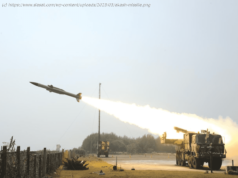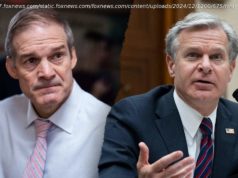THE WHITE HOUSE
THE WHITE HOUSE
Office of the Press Secretary
________________________________________________________________
For Immediate Release July 16,2018
REMARKS BY PRESIDENT TRUMP
AND PRESIDENT PUTIN OF THE RUSSIAN FEDERATION
IN JOINT PRESS CONFERENCE
Presidential Palace
Helsinki, Finland
5:10 P. M. EEST
PRESIDENT PUTIN: (As interpreted.) Distinguished Mr. President, ladies and gentlemen: Negotiations with the President of the United States Donald Trump took place in a frank and businesslike atmosphere. I think we can call it a success and a very fruitful round of negotiations.
We carefully analyzed the current status — the present and the future of the Russia-United States relationship; key issues of the global agenda. It’s quite clear to everyone that the bilateral relationship are going through a complicated stage, and yet those impediments — the current tension, the tense atmosphere — essentially have no solid reason behind it.
The Cold War is a thing of past. The era of acute ideological confrontation of the two countries is a thing of the remote past, is a vestige of the past. The situation in the world changed dramatically.
Today, both Russia and the United States face a whole new set of challenges. Those include a dangerous maladjustment of mechanisms for maintaining international security and stability, regional crises, the creeping threats of terrorism and transnational crime. It’s the snowballing problems in the economy, environmental risks, and other sets of challenges. We can only cope with these challenges if we join the ranks and work together. Hopefully, we will reach this understanding with our American partners.
Today’s negotiations reflected our joint wish — our joint wish with President Trump to redress this negative situation and bilateral relationship, outline the first steps for improving this relationship to restore the acceptable level of trust, and going back to the previous level of interaction on all mutual interests issues.
As major nuclear powers, we bear special responsibility for maintaining international security. And it made it vital — and we mentioned this during the negotiations — it’s crucial that we fine-tune the dialogue on strategic stability and global security and nonproliferation of weapons of mass destruction. We submitted our American colleagues a note with a number of specific suggestions.
We believe it necessary to work together further to interact on the disarmament agenda, military, and technical cooperation. This includes the extension of the Strategic Offensive Arms Limitation Treaty. It’s a dangerous situation with the global American anti-missile defense system; it’s the implementation issues with the INF treaty; and, of course, the agenda of non-placement of weapons in space.
We favor the continued cooperation in counterterrorism and maintaining cybersecurity. And I’d like to point out specifically that our special services are cooperating quite successfully together. The most recent example is their operational cooperation within the recently concluded World Football Cup.
In general, the contacts among the special services should be put to a system-wide basis — should be brought to a systemic framework. I recall — I reminded President Trump about the suggestion to reestablish the working group on antiterrorism.
We also mentioned a plethora of regional crises. It’s not always that our postures dovetail exactly. And yet, the overlapping and mutual interests abound. We have to look for points of contact and interact closer in a variety of international fora.
Clearly, we mentioned the regional crisis; for instance, Syria. As far as Syria is concerned, the task of establishing peace and reconciliation in this country could be the first showcase example of this successful joint work. Russia and the United States apparently can act proactively and take — assume the leadership on this issue, and organize the interaction to overcome humanitarian crisis, and help Syrian refugees to go back to their homes.
In order to accomplish this level of successful cooperation in Syria, we have all the required components. Let me remind you that both Russian and American military have acquired a useful experience of coordination of their action, established the operational channels of communication which permitted to avoid dangerous incidents and unintentional collisions in the air and in the ground.
Also, crushing terrorists in the southwest of Syria — the south of Syria — should be brought to the full compliance with the Treaty of 1974 about the separation of forces — about separation of forces of Israel and Syria. This will bring peace to Golan Heights and bring a more peaceful relationship between Syria and Israel, and also to provide security of the state of Israel.
Mr. President paid special attention to the issue during today’s negotiations, and I would like to confirm that Russia is interested in this development, and this will act accordingly. Thus far, we will make a step toward creating a lasting peace in compliance with the respective resolutions of Security Council, for instance, the Resolution 338.
We’re glad that the Korean Peninsula issue is starting to resolve. To a great extent, it was possible thanks to the personal engagement of President Trump, who opted for dialogue instead of confrontation.
You know, we also mentioned our concern about the withdrawal of the United States from the JCPOA. Well, the U. S. — our U. S. counterparts are aware of our posture. Let me remind you that thanks to the Iranian nuclear deal, Iran became the most controlled country in the world; it submitted to the control of IAEA. It effectively ensures the exclusively peaceful nature of the Iranian nuclear program and strengthens the nonproliferation regime.
While we discussed the internal Ukrainian crisis, we paid special attention to the bona fide implementation of Minsk Agreements by Kiev. At the same time, the United States could be more decisive in nudging the Ukrainian leadership and encourage it to work actively on this. We paid more attention to economic ties and economic cooperation. It’s clear that both countries — the businesses of both countries are interested in this.
The American delegation was one of the largest delegations in the St. Petersburg economic forum. It featured over 500 representatives from American businesses. We agreed — me and President Trump — we agreed to create the high-level working group that would bring together captains of Russian and American business. After all, entrepreneurs and businessmen know better how to articulate this successful business cooperation. We’ll let them think and make their proposals and their suggestions in this regard.
Once again, President Trump mentioned the issue of the so-called interference of Russia when the American elections, and I had to reiterate things I said several times, including during our personal contacts, that the Russian state has never interfered and is not going to interfere into internal American affairs, including the election process.
Any specific material, if such things arise, we are ready to analyze together. For instance, we can analyze them through the joint working group on cybersecurity, the establishment of which we discussed during our previous contacts.
And clearly, it’s past time we restore our cooperation in the cultural area, in the humanitarian area, as far as — I think you know that recently we hosted the American congressmen delegation, and now it’s perceived and portrayed almost as a historic event, although it should have been just a current affairs — just business as usual. And in this regard, we mentioned this proposal to the President.
But we have to think about the practicalities of our cooperation, but also about the rationale — the underlying logic of it. And we have to engage experts on bilateral relationship who know history and the background of our relationship. The idea is to create an expert council that would include political scientists, prominent diplomats, and former military experts from both countries who would look for points of contact between the two countries, that would look for ways on putting the relationship on the trajectory of growth.
In general, we are glad with the outcome of our first full-scale meeting because previously we only had a chance to talk briefly on international fora. We had a good conversation with President Trump, and I hope that we start to understand each other better. And I’m grateful to Donald for it.
Clearly, there are some challenges left when we were not able to clear all the backlog. But I think that we made a first important step in this direction.
And in conclusion, I want to point out that this atmosphere of cooperation is something that we are especially grateful for to our Finnish hosts. We’re grateful for Finnish people and Finnish leadership for what they’ve done. I know that we’ve caused some inconvenience to Finland, and we apologize for it.
Thank you for your attention.
PRESIDENT TRUMP: Thank you. Thank you very much.
Thank you. I have just concluded a meeting with President Putin on a wide range of critical issues for both of our countries. We had direct, open, deeply productive dialogue. It went very well.
Before I begin, I want to thank President Niinistö of Finland for graciously hosting today’s summit. President Putin and I were saying how lovely it was and what a great job they did.
I also want to congratulate Russia and President Putin for having done such an excellent job in hosting the World Cup. It was really one of the best ever and your team also did very well. It was a great job.
I’m here today to continue the proud tradition of bold American diplomacy. From the earliest days of our republic, American leaders have understood that diplomacy and engagement is preferable to conflict and hostility. A productive dialogue is not only good for the United States and good for Russia, but it is good for the world.
The disagreements between our two countries are well known, and President Putin and I discussed them at length today. But if we’re going to solve many of the problems facing our world, then we are going to have to find ways to cooperate in pursuit of shared interests.
Too often, in both recent past and long ago, we have seen the consequences when diplomacy is left on the table. We’ve also seen the benefits of cooperation. In the last century, our nations fought alongside one another in the Second World War. Even during the tensions of the Cold War, when the world looked much different than it does today, the United States and Russia were able to maintain a strong dialogue.
But our relationship has never been worse than it is now. However, that changed as of about four hours ago. I really believe that. Nothing would be easier politically than to refuse to meet, to refuse to engage. But that would not accomplish anything. As President, I cannot make decisions on foreign policy in a futile effort to appease partisan critics or the media, or Democrats who want to do nothing but resist and obstruct.
Constructive dialogue between the United States and Russia affords the opportunity to open new pathways toward peace and stability in our world. I would rather take a political risk in pursuit of peace than to risk peace in pursuit of politics. As President, I will always put what is best for America and what is best for the American people.
During today’s meeting, I addressed directly with President Putin the issue of Russian interference in our elections. I felt this was a message best delivered in person. We spent a great deal of time talking about it, and President Putin may very well want to address it, and very strongly — because he feels very strongly about it, and he has an interesting idea.
We also discussed one of the most critical challenges facing humanity: nuclear proliferation. I provided an update on my meeting last month with Chairman Kim on the denuclearization of North Korea. And after today, I am very sure that President Putin and Russia want very much to end that problem. They’re going to work with us, and I appreciate that commitment.
The President and I also discussed the scourge of radical Islamic terrorism. Both Russia and the United States have suffered horrific terrorist attacks, and we have agreed to maintain open communication between our security agencies to protect our citizens from this global menace.
Last year, we told Russia about a planned attack in St. Petersburg, and they were able to stop it cold. They found them. They stopped them. There was no doubt about it. I appreciated President Putin’s phone call afterwards to thank me.
I also emphasized the importance of placing pressure on Iran to halt its nuclear ambitions and to stop its campaign of violence throughout the area, throughout the Middle East.
As we discussed at length, the crisis in Syria is a complex one. Cooperation between our two countries has the potential to save hundreds of thousands of lives. I also made clear that the United States will not allow Iran to benefit from our successful campaign against ISIS. We have just about eradicated ISIS in the area.
We also agreed that representatives from our national security councils will meet to follow up on all of the issues we addressed today and to continue the progress we have started right here in Helsinki.
Today’s meeting is only the beginning of a longer process. But we have taken the first steps toward a brighter future and one with a strong dialogue and a lot of thought. Our expectations are grounded in realism but our hopes are grounded in America’s desire for friendship, cooperation, and peace. And I think I can speak on behalf of Russia when I say that also.
President Putin, I want to thank you again for joining me for these important discussions and for advancing open dialogue between Russia and the United States. Our meeting carries on a long tradition of diplomacy between Russia, the United States, for the greater good of all.
And this was a very constructive day. This was a very constructive few hours that we spent together. It’s in the interest of both of our countries to continue our conversation, and we have agreed to do so.
I’m sure we’ll be meeting again in the future often, and hopefully we will solve every one of the problems that we discussed today.
So, again, President Putin, thank you very much.
MODERATOR: (As interpreted.) Distinguished Presidents, now the journalists would have a chance to ask two questions, two sets of question each. First, the Russian journalist will ask the question. Please give your affiliation.
Q (As interpreted.) Good afternoon, my name is Alexei Meshkov, Interfax information agency. I have a question to President Trump. During your recent European tour, you mentioned that the implementation of the Nord Stream 2 gas pipeline makes Europe the hostage of Russia. And you suggested that you could free Europe from this by supplying American LNG. But this cold winter actually showed that the current model — current mechanism of the supply of fuel to Europe is quite viable. At the same time, as far as I know, U. S. had to buy even Russian gas for Boston.
I have a question. The implementation of your idea has a political tinge to it, or is this a practical one? Because there will be a gap formed in the supply and demand mechanism, and first it’s the consuming countries who will fall into this gap.
And the second question: Before the meeting with President Putin, you called him an adversary, a rival, and yet you expressed hope that you would be able to bring this relationship to a new level. Did you manage to do this?
PRESIDENT TRUMP: Actually, I called him a competitor. And a good competitor he is. And I think the word “competitor” is a — it’s a compliment. I think that we will be competing, when you talk about the pipeline. I’m not sure necessarily that it’s in the best interest of Germany or not, but that was a decision that they made. We’ll be competing — as you know, the United States is now, or soon will be — but I think it actually is right now — the largest in the oil and gas world.
So we’re going to be selling LNG and we’ll have to be competing with the pipeline. And I think we’ll compete successfully, although there is a little advantage locationally. So I just wish them luck. I mean, I did. I discussed with Angela Merkel in pretty strong tones.






